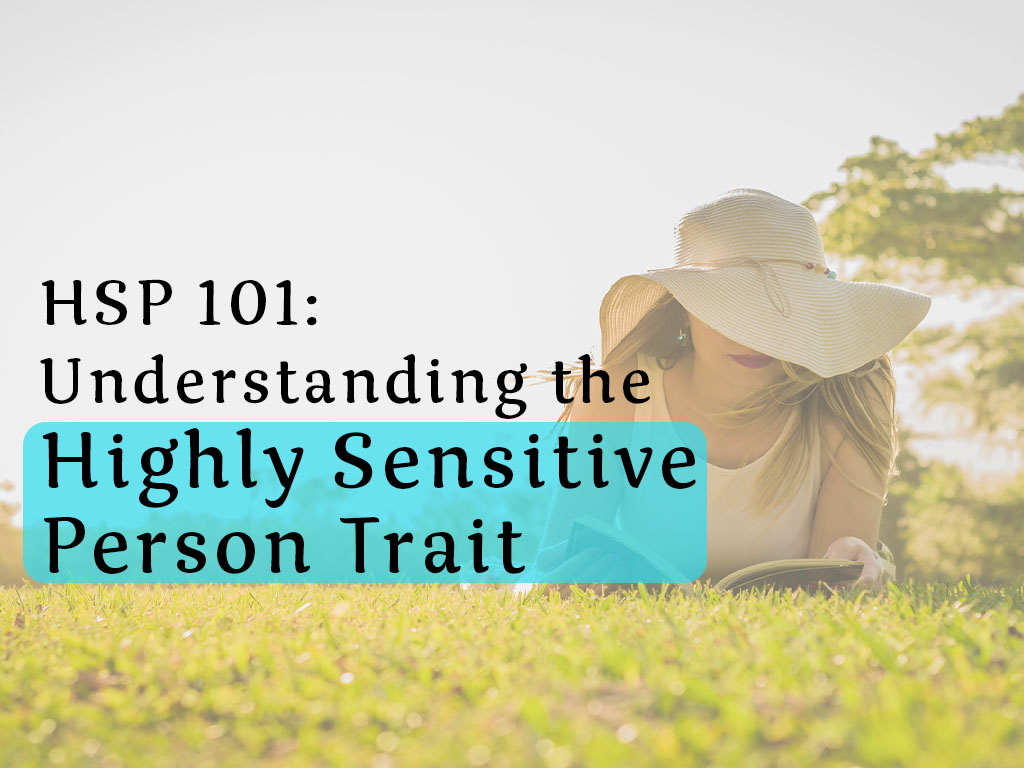You may have heard the term, “highly sensitive’ or ‘highly sensitive person,’ and you might not know what it means. It might sound like a put-down, or maybe something you overheard a parent say about you to someone else. Whichever way you cut it, being called sensitive has almost always been a bad thing. That is, until Dr. Elaine Aron began to study what she named, “the Highly Sensitive Person trait.”

No longer is it a put-down. No longer is it a term to avoid. The rise of the sensitives is happening now–and we are a part of a new era where there is freedom to embrace our God-given sensitivity, harness it, shape it through understanding, and use it to be the person we’re meant to be.
What does it mean to have the Highly Sensitive Person trait?
In 1996, psychotherapist and researcher, Dr. Elaine N. Aron, first published her seminal work, The Highly Sensitive Person: How to Thrive When the World Overwhelms You. Now a national bestseller and foundation of a movement to better understand the trait of high sensitivity, Dr. Aron posed that high sensitivity was “not an illness or a flaw,” but a trait present in what she documented as a scientifically-proven trait present in 15-20% of the population.
“DOES” Acronym Helps Understand the Highly Sensitive Person Trait
The DOES acronym describes the key foundations of the Highly Sensitive Person trait and helps to better understand what attributes a Highly Sensitive Person possesses.
D is for Depth of Processing
At the foundation of the trait of high sensitivity is the tendency to process information more deeply.” -Dr. Elaine N. Aron, The Highly Sensitive Person, xvii
- HSPs process sensory input more than everyone else.
- HSPs tend to trust and rely on their intuition more.
- HSPs use more of those parts of the brain associated with task processing and noticing subtleties.
O is for Overstimulation
Highly sensitives of all ages tend to dislike overstimulation such as a full day at the mall followed by a loud party full of people. They might dislike loud rock concerts, large social groups, and even classrooms if the teacher can’t control the noise level.
- HSPs tend to exhibit signs of overstimulation, and this is often what people notice most about them.
- HSPs can mix up signs of sensory discomfort with their sensitivity. There are differences.
- HSPs can struggle with where to focus when they are overstimulated by say a loud person, a busy street, and a phone ringing.

Looking for an HSP-Trained coach to help you align your life with your priorities?
Through my Highly Sensitive Person (HSP) certification with the Nickerson Institute, as well as being an HSP, I offer HSP coaching to develop specific goals around your HSP needs. We HSPs frequently deal with anxiety and overstimulated nervous systems that prevent us from achieving peace and attaining our life goals. HSP coaching with me includes a detailed review of your sensitivities and a mutually-desired plan for growth and management of this superpower to shift negativity and begin seeing yourself as the hero of your own story. (Affordable monthly coaching begins at $150/month.)
E is for Emotional Reactivity
Studies have shown that highly sensitive people respond empathetically to pictures of people exhibiting emotions. In facilitating her research, Aron found in brain scans of HSPs viewing people who were displaying happiness, sadness, and neutral feelings, the mirror neuron system showed more activity.
These mirror neurons are thought to be responsible for the universal human capacity for empathy.” -Dr. Elaine N. Aron, The Highly Sensitive Person, xx
- HSPs often “feel” what others are feeling, beyond normal empathy.
- HSPs often take closer notice of their emotions, and emotions are thought to be at the center of wisdom.
- HSPs tend to relish good outcomes and become motivated by positive emotional reactions more than others.
S is for Sensing the Subtle
At the heart of many highly sensitives is the ability to perceive subtleties in any (and nearly every) situation. While overstimulation can thwart the perceiving abilities of HSPs, if the conditions are right, many have said they feel they can “see” the emotions and mood of a person. According to Aron, this s not due to having better eyesight or hearing, although this is possible, it is rather due to the complexity in processing sensory information.
- HSPs rely on awareness and non-verbal cues to gain valuable information on the world around them.
- HSPs often have extra-sensory perception, not necessarily based on the five senses, but because of their abilities to notice subtleties in their environment.
- HSPs, when tired or worn out, often desire a break from processing their environments.
Each Person With the Highly Sensitive Person Trait is Unique
While many individuals identify with one or more of these descriptors, each person and each Highly Sensitive Person is completely unique with their own gifts, skills, and sensitivities. I appreciate that Dr. Aron frequently pauses in her book to remind us that we are all unique and no one has the exact same experiences as a highly sensitive.
I feel strongly that there is power in fully understanding the way you were created. Understanding your trait as a Highly Sensitive Person can provide deep understanding, insight into your childhood can help heal from trauma and sadness, as well as flourish.
How do I know if I’m a Highly Sensitive Person (HSP)?
This is a great question. Many people who are highly sensitive feel that they were not understood as children. They were frequently told they were too sensitive or cried too often. You can reference our list of HSP quizzes to see how you score and this can inform whether or not you are a Highly Sensitive Person.
Be sensitive, be free
*This post contains affiliate links and I will be compensated if you make a purchase after clicking on my links*





[…] one or more siblings. Maybe your loud Italian Grandma lived with you. If there’s one thing most Highly Sensitive People agree on, it’s that we like quiet. LOTS of quiet. For a child who has to go to loud raucous […]